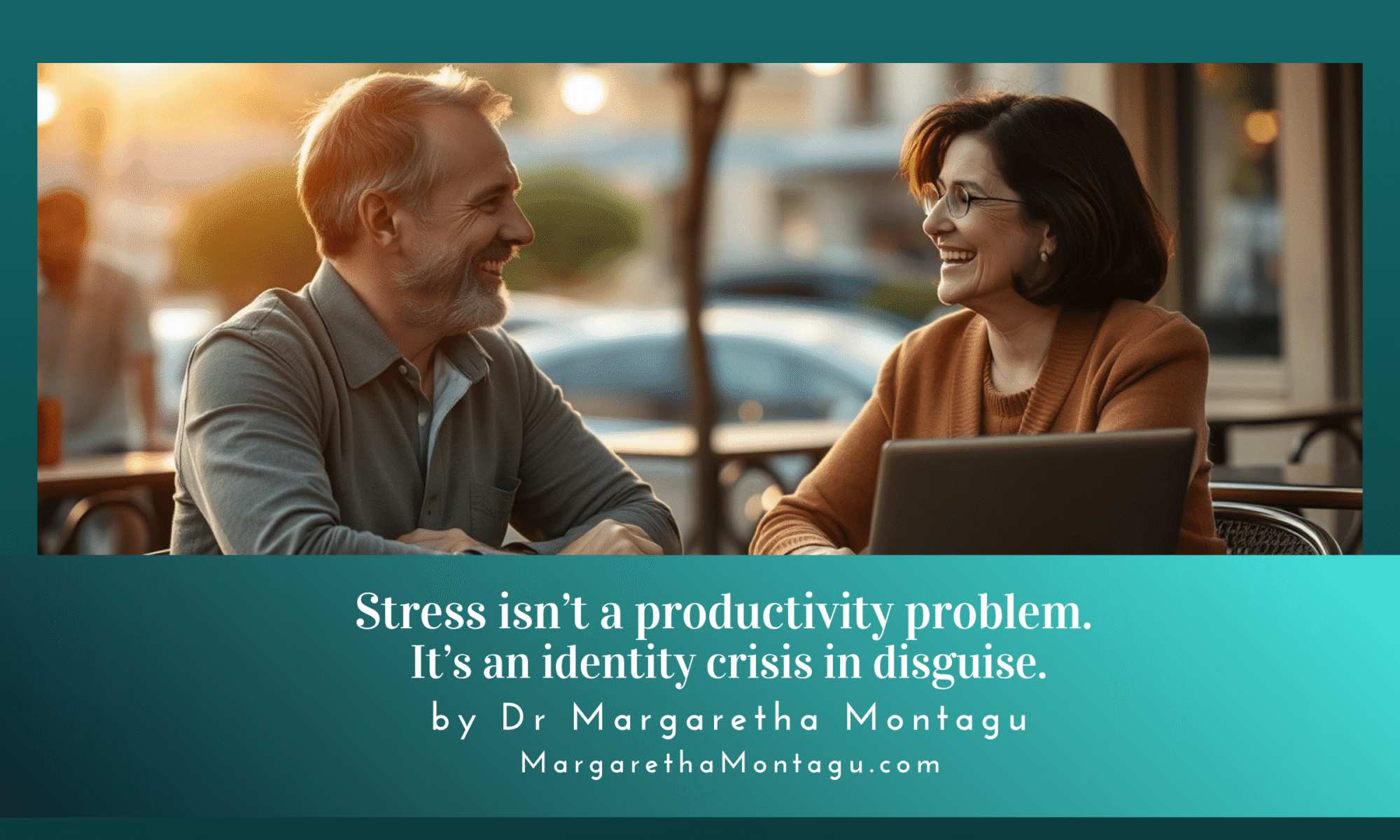What this isn’t: Another productivity hack. Another time management system. Another “10 ways to optimise your morning routine” listicle. If you’re looking for tips on inbox zero or batch processing meetings, this isn’t your article. Also not here: toxic positivity or the suggestion that you simply need to “lean in” harder.
What this is: A wake-up call for high-achievers who’ve realised their calendar isn’t the problem, their relationship with themselves is. This is about the existential reckoning that happens when you’ve built your entire identity around being brilliant at your job, and then one day you wake up and wonder who you’d be without the title on your business card.
Read this if: You’ve achieved everything you set out to achieve and still feel hollow. You feel guilty when you’re not working. You’ve forgotten what you enjoy outside of professional achievement. You can run a multi-million pound operation but can’t remember the last time you felt genuinely at peace. Or if you’re simply curious about why your stress persists despite doing everything “right.”
Five Key Takeaways
- Burnout is rarely about workload, it’s about maintaining an identity that no longer fits who you’re becoming. The exhaustion comes from the constant performance of being who you think you should be.
- Your self-worth and your professional performance are not the same thing, though our achievement-obsessed culture has convinced you otherwise. Separating these is the most important leadership work you’ll ever do.
- The signs of identity crisis masquerading as stress include guilt during rest, inability to have non-work conversations, mood dependency on recent wins/losses, and feeling threatened by others’ success.
- Sustainable leadership requires internal work, not external systems. The leaders who thrive long-term aren’t the most productive, they’re the ones who know themselves beyond their accomplishments.
- Acknowledging this struggle isn’t weakness, it’s courage. The most dangerous leaders are the ones pretending they don’t question their identity. The most effective ones have done the hard work of separating who they are from what they do.
Introduction
Most high-performing leaders don’t burn out because they can’t manage their time. They burn out because they own an identity that’s silently cracking under pressure.
I’ve seen it happen dozens of times. Brilliant executives who can navigate complex mergers, inspire teams through impossible challenges, and make decisions that affect thousands of lives, suddenly finding themselves paralysed by a kind of exhaustion that no amount of sleep can fix.
Because executive stress isn’t a productivity problem. It’s an identity crisis in disguise.
Think about it. You’ve spent decades building an identity around being the person who delivers, who solves problems, who never drops the ball. Your self-worth became intertwined with your performance. Your value as a human being got quietly attached to your value as a leader.
Then one day, the metrics shift. The goalposts move. The board wants different results. Your team needs a different kind of leadership. Or your body simply refuses to maintain the pace you’ve been running for the past fifteen years.
And suddenly, the identity you’ve carefully constructed starts to crack.
The hidden cost of “always on”
I remember a CEO telling me, “I don’t know who I am when I’m not solving problems.” She said it casually, almost laughing. But there was something haunting in that admission.
She had become so identified with her role as the fixer, the visionary, the one with all the answers, that the thought of stepping back felt like erasing herself. Her stress wasn’t about the hours she worked or the complexity of her challenges. It was about the existential threat of discovering she might be more than her achievements.
This is the trap: we build our entire sense of self around being exceptional at what we do. Then we wonder why we feel empty even when we succeed. We wonder why rest feels impossible. We wonder why we can’t shake the anxiety even when the quarter exceeds expectations.
The signs you might be managing an identity crisis, not a time management problem:
You feel guilty when you’re not working, even during designated time off. You struggle to have conversations that aren’t about work. Your mood is entirely dependent on your last win or loss. You’ve forgotten what you enjoy outside of professional achievement. You feel threatened when someone else succeeds or questions your approach.
If any of these resonate, you’re not alone. And you’re not broken. You’re just caught in a pattern that our high-achievement culture actively encourages.
Stress destroys Lives. To find out what you can do to safeguard your sanity by taking my insight-giving quiz, subscribe to my mailing list.
What actually helps:
The answer isn’t another framework for peak performance. It’s not a better morning routine or a more sophisticated approach to inbox zero.
It starts with asking yourself a harder question: Who am I when I’m not producing, achieving, or proving my worth?
This isn’t soft. This is the hardest work a leader can do. It requires examining the stories you’ve been telling yourself about what makes you valuable. It means separating your identity from your outcomes. It means building a sense of self that isn’t dependent on external validation or constant achievement.
For some leaders, this looks like therapy. For others, it’s coaching, spiritual practice, or simply creating space for genuine self-reflection. The method matters less than the willingness to look honestly at what you’ve been running from.
The most valuable leaders aren’t the ones who’ve mastered productivity. They’re the ones who’ve done the internal work to know themselves beyond their titles and accomplishments.
They can weather setbacks without experiencing them as personal failures. They can celebrate others’ success without feeling diminished. They can rest without guilt because their worth isn’t tied to constant output. They can evolve their leadership style because they’re not desperately clinging to an identity that worked in a previous chapter.
If you’re reading this and feeling that uncomfortable recognition, I want you to know: acknowledging this isn’t weakness.
The leaders who pretend they don’t struggle with this are the ones who end up with health crises, broken relationships, and careers that implode spectacularly. The leaders who face it become more effective, more present, and infinitely more human.
The Story of Catherine Brennan
Catherine Brennan’s hands trembled as she gripped the steering wheel in the executive car park at 11:47 on a Tuesday morning. The leather was cold beneath her palms despite the June heat radiating through the windscreen. She could smell the sharp, synthetic scent of the air freshener hanging from her rear-view mirror, mixed with the stale coffee from the cup sitting in the holder beside her.
She’d just walked out of a board meeting. Simply stood up, mid-presentation, mumbled something about feeling unwell, and left. Twenty-three years of impeccable professional conduct, and she’d walked out like a startled animal fleeing a predator.
The thing was, she wasn’t actually unwell. Not in any way she could name. Her chest felt tight, yes. Her vision had gone slightly fuzzy at the edges. Her heart was hammering against her ribs like it was trying to escape. But these symptoms had become so familiar over the past eight months that she’d stopped registering them as unusual.
What had finally broken her wasn’t the workload. Catherine had managed impossible workloads before. She’d pulled off product launches that everyone said were doomed. She’d turned around underperforming divisions. She’d negotiated deals that made the business press write glowing profiles about her strategic brilliance.
No, what broke her was the question her new CFO had asked during the presentation: “Catherine, what’s your vision for who you want to become as a leader over the next five years?”
It should have been an easy question. She was the Chief Operating Officer of a major manufacturing firm. She had opinions on everything from supply chain optimisation to leadership development. She could talk for hours about strategic direction, market positioning, competitive advantage.
But in that moment, staring at twelve faces around the polished mahogany table, Catherine realised with horrifying clarity that she had absolutely no idea who she wanted to become. She only knew who she’d been trained to be. Who she’d been rewarded for being. Who everyone expected her to continue being.
And she was so achingly tired of being that person.
The truth had hit her with such force that she’d actually felt dizzy. The fluorescent lights had seemed too bright. The air conditioning too loud. She could hear her own pulse in her ears, could taste the metallic tang of panic in her mouth. Her colleague James had been speaking, she could see his lips moving, but the words sounded like they were coming from underwater.
That’s when she’d stood up and walked out.
Now, sitting in her car, Catherine pressed her forehead against the steering wheel. The plastic was warm from the sun. She could hear the distant sound of traffic from the main road, the rhythmic beeping of a lorry reversing somewhere in the industrial estate. Her phone was buzzing incessantly in her bag, the vibration creating a dull rattle against her keys and lipstick case.
She didn’t reach for it.
Instead, she found herself thinking about something that had happened three weeks earlier. She’d been at her daughter Emma’s school concert. Emma, fifteen and fiercely independent, had a solo in the choir performance. Catherine had arrived late, of course, slipping into the back row just as the lights dimmed. She’d spent the entire concert responding to emails on her phone, the screen brightness turned down low.
Afterwards, Emma had asked, “Did you hear my solo?”
“Of course,” Catherine had lied smoothly. “You were wonderful.”
Emma had looked at her with an expression Catherine couldn’t quite read. Not anger exactly. Something sadder. Resignation, perhaps. “You weren’t listening, Mum. I could see you on your phone.”
Catherine had started to protest, to explain about the urgent client situation, but Emma had just shrugged and walked away.
Sitting in the car park now, Catherine realised she couldn’t remember the last time she’d actually listened to anything that wasn’t work-related. Couldn’t remember the last time she’d been fully present anywhere. Couldn’t remember who she was when she wasn’t being the Catherine Brennan who delivered results, exceeded targets, solved problems.
She’d built an entire identity around being exceptional. Around being the woman who could handle anything. The one who never cracked under pressure. The one who made it look effortless.
And now that identity was suffocating her.
Her phone stopped buzzing. In the sudden silence, Catherine could hear birds singing in the trees that lined the car park. When had she last noticed birdsong? She wound down the window slightly, and warm air rushed in, carrying the scent of cut grass from somewhere nearby.
For the first time in months, possibly years, Catherine let herself sit with the uncomfortable question: If she wasn’t the brilliant, tireless, always-on executive, then who was she?
The question terrified her. But somewhere underneath the terror was something else. Something that felt almost like relief.
The Hidden Architecture of Executive Identity
What Catherine experienced in that car park is far more common than most leaders admit. We spend decades constructing an identity around professional achievement, and then we wonder why we feel trapped, exhausted, and fundamentally disconnected from ourselves.
The architecture of this identity crisis follows a predictable pattern. First, we achieve something difficult. We get praised, promoted, and recognised. Our brain registers this: achievement equals worth. So we achieve more. The rewards increase. Our identity becomes increasingly entangled with our professional performance.
Then something shifts. Perhaps the goalpost moves. Perhaps our body refuses to maintain the pace. Perhaps we simply wake up one day and realise we’ve been performing a role for so long that we’ve forgotten it was a role at all.
The stress that follows isn’t about having too many meetings or insufficient delegation. It’s existential. It’s about the fundamental question of who we are when we’re not producing, achieving, or proving our worth.
This manifests in specific, recognisable ways. You feel guilty when you’re not working, even during designated time off. Rest feels like failure. You struggle to have conversations that aren’t about work because work has become your primary source of identity, meaning, and connection. Your mood becomes entirely dependent on your last win or loss, because you’ve outsourced your sense of self to external validation.
You might find yourself feeling threatened when someone else succeeds or questions your approach, because you’ve built your identity on being the one with the answers. You might discover you’ve forgotten what you enjoy outside of professional achievement, because you’ve systematically eliminated anything that doesn’t contribute to your professional identity.
The culture we work in actively encourages this pattern. We celebrate the leader who responds to emails at midnight. We admire the executive who hasn’t taken a proper holiday in years. We reward the person who makes their work their life. And we wonder why so many brilliant leaders eventually crash.
What makes this particularly insidious is that the traditional solutions don’t work. You can’t productivity-hack your way out of an identity crisis. You can’t delegate your way to wholeness. You can’t optimise your morning routine into self-knowledge.
The work required is far more fundamental. It requires examining the stories you’ve been telling yourself about what makes you valuable. It means separating your identity from your outcomes. It means building a sense of self that isn’t dependent on external validation or constant achievement.
This isn’t comfortable work. It requires sitting with difficult questions. Who am I beyond my job title? What do I value when no one’s watching? What would I do if I knew I couldn’t fail? What would I do if success wasn’t the point?
For many leaders, this involves confronting beliefs they’ve held since childhood. Perhaps you learned early that love was conditional on achievement. Perhaps you watched a parent derive all their worth from work. Perhaps you survived difficult circumstances by becoming exceptional, and now you don’t know how to stop performing excellence.
The journey out of this pattern isn’t about becoming less ambitious or lowering your standards. It’s about expanding your sense of self beyond your professional identity. It’s about recognising that you are infinitely more than your achievements, and that your worth is inherent, not earned.
The Ripple Effect
When a leader does this internal work, something remarkable happens. The effects ripple outward in ways that transform not just the individual, but their entire sphere of influence.
Catherine’s breakthrough in that car park was the beginning of a profound transformation that affected her family, her team, and eventually her entire organisation. When she stopped deriving all her worth from work, she became genuinely present with her daughter for the first time in years. Emma, who’d been withdrawing into sullen silence, began to open up. Their relationship, which had been transactional at best, deepened into real connection.
Her team noticed the change immediately. Catherine stopped micromanaging because she was no longer terrified that others’ failures would reflect on her worth. She began mentoring differently, focusing on developing people rather than extracting performance. Three team members who’d been planning to leave the company decided to stay. Two others found the courage to pursue projects they’d been too intimidated to suggest.
The organisation itself shifted. When a senior leader models the truth that worth and performance are separate, it gives permission for others to be human. Meetings became more honest. Innovation increased because people felt safe to fail. Collaboration improved because competition for worth wasn’t the subtext of every interaction.
But perhaps most importantly, Catherine’s willingness to face her identity crisis gave other leaders permission to examine their own. Her vulnerability created space for authentic conversation about the real challenges of leadership, the ones that don’t appear in annual reports or strategy documents.
This is the gift of doing your own internal work. You don’t just heal yourself. You create conditions for collective healing. You model what sustainable leadership actually looks like. You demonstrate that it’s possible to be both ambitious and whole, both successful and human.
Writing Prompt: Excavating Your Identity
Take twenty minutes with this prompt. Don’t think too hard. Let your hand move across the page and see what emerges.
“When I’m not being productive, I feel ___ because I believe ___ about who I am. If I knew my worth was inherent, not earned, I would ___.”
Don’t censor yourself. Don’t make it sound good. Just write honestly. This is for you alone.
Some questions to deepen your exploration:
- What did you learn about worth and achievement in childhood?
- What are you afraid would happen if you stopped performing excellence?
- Who are you when no one’s watching and nothing needs to be accomplished?
- What would you do if you knew you were already enough?
Five Sharp FAQs
Q: Isn’t it naive to separate identity from achievement in a competitive business environment?
A: Actually, it’s naive to believe sustainable high performance can come from a fragile identity dependent on constant external validation. The leaders who last are the ones who know themselves beyond their wins and losses. They can take risks because failure isn’t an existential threat. They innovate because they’re not desperately protecting an identity. Separating worth from achievement doesn’t make you less effective. It makes you infinitely more resilient.
Q: How do I know if I’m experiencing identity crisis or just normal work stress?
A: Normal work stress responds to rest, delegation, and time management. Identity crisis doesn’t. If you feel guilty when you’re not working, if your mood is entirely dependent on your last win, if you can’t remember who you are outside of work, if rest feels like failure, you’re dealing with something deeper than logistics. The simplest test: can you enjoy a weekend without checking email? Can you have a conversation that’s not about work? If the answer is no, start paying attention.
Q: Won’t addressing this make me less driven or ambitious?
A: This is the fear that keeps people trapped. But here’s what actually happens: when you stop deriving all your worth from achievement, you become more effective, not less. You make better decisions because you’re not frantically trying to prove yourself. You build better teams because you’re not threatened by others’ success. You take smarter risks because failure isn’t an identity crisis. You lead longer because you’re not burning yourself out maintaining a performance. Real ambition doesn’t require self-destruction.
Q: I’ve built my entire career on being the person who delivers. Won’t changing this threaten my position?
A: What threatens your position is burning out spectacularly because you never did this work. The leaders who lose everything are the ones who cling to an unsustainable identity until it breaks them. The leaders who thrive are the ones brave enough to evolve. You can still deliver exceptional results while also being a complete human being. In fact, you’ll deliver better results because you’ll have the resilience and perspective that comes from knowing yourself beyond your achievements.
Q: Where do I even start with this work?
A: Start by noticing. Notice when you feel guilty for not working. Notice when your mood shifts with your last email. Notice when you feel threatened by someone else’s success. Notice when you can’t be fully present. Don’t try to fix anything yet. Just notice. Then, find support. This might be therapy, coaching, a trusted mentor, or simply creating space for honest self-reflection. The work isn’t comfortable, but it’s infinitely more comfortable than continuing to live in a fragmented relationship with yourself.
Conclusion: Courageous Leadership
The most courageous thing a leader can do isn’t to achieve more, work harder, or deliver bigger results. It’s to look honestly at the identity they’ve constructed and ask if it’s still serving them, or if they’re now serving it.
This work isn’t soft. It’s the hardest work you’ll ever do. It requires confronting uncomfortable truths about why you drive yourself, what you’re running from, and who you’re afraid you’d be if you stopped performing.
But on the other side of this work is a kind of leadership that’s sustainable, authentic, and genuinely transformative. Leadership that doesn’t require you to sacrifice your humanity on the altar of achievement. Leadership that creates space for others to be whole. Leadership that changes not just organisations, but lives.
Catherine Brennan eventually went back into that building. But she went back different. She went back knowing that her worth wasn’t dependent on that board meeting, that presentation, or any outcome at all. She went back as a complete human being who happened to be brilliant at her job, rather than someone whose entire existence depended on being brilliant.
A Different Kind of Retreat
If this article has stirred something in you, if you’re recognising yourself in these words and feeling both terrified and relieved, I want to invite you to something genuinely different.
I run stress relief retreats on the Camino de Santiago in the south-west of France, but these aren’t your typical corporate wellness programmes with forced team-building exercises and motivational speakers. These are intimate, transformational experiences for leaders ready to do the real work of remembering who they are beyond their achievements.
We walk ancient pilgrimage paths together, creating space for the kind of reflection that’s impossible in your everyday environment. We practice mindfulness and meditation, not as productivity tools, but as ways of reconnecting with yourself. We gather in storytelling circles with my Friesian horses. There’s something profoundly healing about being witnessed by these magnificent creatures, who respond only to who you actually are, not to your title or your accomplishments.
The horses don’t care about your CV. They care about your presence, your authenticity, your capacity to be genuinely here, now. They’ll show you, with startling clarity, when you’re performing and when you’re real. It’s uncomfortable and extraordinary in equal measure.
These retreats are for leaders who know that sustainable success requires internal work, not just external systems. For people brave enough to acknowledge that the stress they’re experiencing might be pointing to something deeper. For those ready to explore who they are when they’re not producing, achieving, or proving their worth.
I keep the groups small because this work requires genuine intimacy and trust. I create space for rest, reflection, and honest conversation.
If you’re curious, you can learn more by clicking here.. But only if you’re ready. This isn’t about adding another achievement to your list. It’s about coming home to yourself.










10 Powerful Life Lessons Learned While Walking the Camino de Santiago – a free guide filled with 10 not just “quaint anecdotes” or Instagram-worthy moments (though there are plenty of those) but real transformations from real people who walked the same insight-giving trail you might want to walk one day – Subscribe to my monthly newsletter to Download the Guide
If you’re feeling overwhelmed, exhausted, or on the edge of burnout, you need immediate support. The Road Map to Resilience: Burnout to Brilliance online course (with the option of adding coaching sessions) is designed for exactly that: a practical, step-by-step course to help you regain control, rebuild your energy, and find clarity in the chaos. This isn’t a quick fix—it’s about proven strategies to calm your nervous system, shift your mindset, and create sustainable resilience. No need to cope with this on your own—let’s get you back on track.


“I am an experienced medical doctor – MBChB, MRCGP, NLP master pract cert, Transformational Life Coach (dip.) Life Story Coach (cert.) Stress Counselling (cert.) Med Hypnotherapy (dip.) and EAGALA (cert.) I may have an impressive number of letters after my name, and more than three decades of professional experience, but what qualifies me to excel at what I do is my intuitive understanding of my clients’ difficulties and my extensive personal experience of managing major life changes using strategies I developed over many years.” Dr M Montagu
Sometimes the most powerful thing a leader can do is admit they’re human. And that being human is more than enough. Margaretha Montagu

